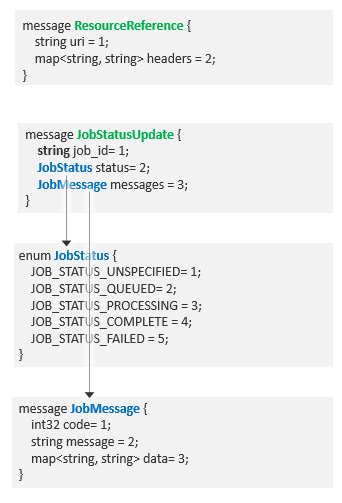Common messages
Messages that are part of the nuance.nlu.common.v1beta1 package are used to reference external files like NLU models and to report job statuses.
nuance.nlu.common.v1beta1.ResourceReference
Input message for fetching an external resource.
| Field | Type | Description |
|---|---|---|
| uri | string | Location of the resource as a URN reference |
| headers | string, string | Field for internal use |
nuance.nlu.common.v1beta1.JobStatusUpdate
Job status update to a request.
| Field | Type | Description |
|---|---|---|
| job_id | string | Not used |
| status | JobStatus | Job status |
| messages | JobMessage | Repeated. Messages specifying about the job failure or completion. |
nuance.nlu.common.v1beta1.JobStatus
Job status enum.
| Name | Number | Description |
|---|---|---|
| JOB_STATUS_UNKNOWN | 0 | Job status not specified or unknown |
| JOB_STATUS_QUEUED | 1 | Not used |
| JOB_STATUS_PROCESSING | 2 | Job is processing |
| JOB_STATUS_COMPLETE | 3 | Job is complete |
| JOB_STATUS_FAILED | 4 | Job has failed |
nuance.nlu.common.v1beta1.JobMessage
Job message.
| Field | Type | Description |
|---|---|---|
| code | int32 | Code |
| message | string | Message |
| data | string, string | Additional key, value pairs |
Scalar value types
The data types in the proto files are mapped to equivalent types in the generated client stub files.
Feedback
Was this page helpful?
Glad to hear it! Please tell us how we can improve.
Sorry to hear that. Please tell us how we can improve.
